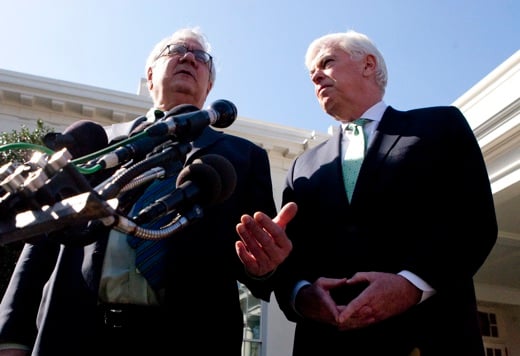Backers of the Dodd-Frank bill, which will be voted on this week, say the measure will prevent another financial crisis while protecting the assets of the American public.<br> Said public isn't buying.
Americans harbor doubts that a financial-regulation bill about to be passed by Congress will do what President Barack Obama says it will: help avoid another crisis and make their finances safer.
Almost four out of five Americans surveyed in a Bloomberg National Poll this month say they have just a little or no confidence that the measure being championed by congressional Democrats will prevent or significantly soften a future crisis. More than three-quarters say they don't have much or any confidence the proposal will make their savings and financial assets more secure.
A plurality -- 47 percent -- says the bill will do more to protect the financial industry than consumers; 38 percent say consumers would benefit more.
“Banks and the government are making out, not the ordinary person,” says Lenore Critzer, a 70-year-old retiree and poll participant who lives in Nelson, Ohio, about 40 miles from Cleveland. “We're going to have another crisis and worse.”
While skeptical about the bill's benefits, Americans don't want a return to the days before the financial markets suffered their biggest turmoil since the Great Depression: A plurality of respondents says they have become more supportive in recent months of tougher regulations. By a three-to-one margin, Americans have grown more favorable to stronger regulation rather than less. Even Republicans have become more inclined to stricter oversight.
‘A Farce'
“What happened was a farce,” says Victor Bruno, a 58- year-old surgeon in Westfield, New Jersey. “These guys were just gambling with our money. Something needs to be done.”
Americans are about evenly divided on the question of government regulation in general. Thirty-five percent of those polled see the need for more oversight, while a third prefer less; 30 percent say the current situation is adequate. In some other national polls before the crisis, a plurality favored less government regulation.
A plurality of respondents age 55 and older -- 39 percent - - still favors a smaller government role. Younger Americans don't agree, with only a quarter of those under 35 in favor of less regulation.
Skepticism about the financial bill, which may be approved this week, cuts across political party lines. Seven in 10 Democrats have little or no confidence the proposals will avert or significantly lessen the impact of another financial catastrophe; 68 percent doubt it will make their savings more secure.
Revamping Oversight
The proposed legislation reshapes oversight of Wall Street, creating a consumer bureau at the Federal Reserve, a council of regulators to monitor firms for risk to the financial system, and a mechanism for liquidating large institutions whose collapse would threaten the economy.
Obama praised the overhaul as “the most comprehensive reform of Wall Street” since the Depression, telling reporters at the White House yesterday that the measure “will prevent a financial crisis like this from happening again, by protecting consumers against the unfair practices of credit card companies and mortgage lenders.”
Americans say the restructuring won't make much difference in the way Wall Street does business. Almost half of those polled say banks will make few if any changes in the way they act in response to the overhaul; another 22 percent expect only minor changes.
“They're just going to find a way around the new rules,” says Pamela Evans, 24, who lives in Everett, Washington, and has two jobs, at a building company and a check-cashing firm.
Democrats More Optimistic
Democrats have greater optimism that consumers will benefit more than the financial industry from the proposals, with 51 percent saying that will be the result. Just 28 percent of Republicans and 35 percent of independents agree.
Most Americans reject any new government rescues of financial institutions, such as arranged for New York-based Citigroup Inc. and insurer American International Group Inc., according to the poll.
They also oppose letting the market work and having the private sector deal with the consequences of any collapse.
Half the respondents think the federal government should force a company to work its way out of any problems, including bankruptcy, through the courts.
Down on Bailouts
Almost 60 percent of respondents say the $700 billion plan that Congress passed in late 2008 to help the banks -- the Troubled Asset Relief Program -- was an unnecessary bailout.
The Bloomberg National Poll was conducted July 9-12 for Bloomberg News by Selzer & Co. of Des Moines, Iowa. Based on interviews with 1,004 U.S. adults, the poll has a margin of error of plus or minus 3.1 percentage points.
“The mood of the American public is highly skeptical toward government and its ability to do right by the average person,” says J. Ann Selzer, president of the polling firm. “That explains some of the apparent contradiction in seeing a need for more regulation yet having little confidence that what is currently on the table will do much for consumers. They just feel they've been played and they don't want to be fooled again.”







